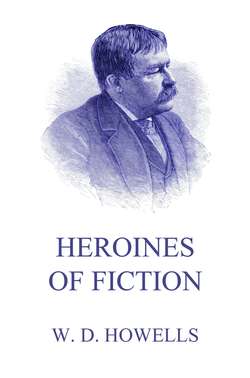Читать книгу Heroines Of Fiction - William Dean Howells - Страница 22
На сайте Литреса книга снята с продажи.
I
ОглавлениеPeople will prefer Anne Eliot to Elizabeth Bennet according as they enjoy a gentle sufferance in women more than a lively rebellion; and it would not be profitable to try converting the worshippers of the one to the cult of the other. But without offence to either following, it may be maintained that "Persuasion" is imagined with as great novelty and daring as " Pride and Prejudice," and that Anne is as genuinely a heroine as Elizabeth.
In "Persuasion" Jane Austen made bold to take the case of a girl, neither weak nor ambitious, who lets the doubts and dislikes of her family and friends prevail with her, and gives up the man she loves because they think him beneath her in family and fortune. She yields because she is gentle and diffident of herself, and her indignant lover resents and despises her submission if he does not despise her. He is a young officer of the navy, rising to prominence in the service which was then giving England the supremacy of the seas, but he is not thought the equal of a daughter of such a baronet as Sir Walter Eliot. It is quite possible that in her portrayal of the odious situation Jane Austen avenges with personal satisfaction the new order against the old, for her brothers were of the navy, and the family hope and pride of the Austens were bound up with its glories. At any rate, when Sir Walter's debts oblige him to let Kellynch Hall, and live on a simple scale in Bath, it is a newly made admiral who becomes his tenant; and it is the brother of the admiral's wife who is Anne's rejected lover, and who now comes to visit his sister, full of victory and prize-money, with the avowed purpose of marrying and settling in life.
Seven years have passed since Frederick Wentworth angrily parted with Anne Eliot. They have never really ceased to love each other; but the effect has been very different with the active, successful man, and the quiet, dispirited girl. No longer in her first youth, she devotes herself to a little round of duties, principally in the family of her foolish, peevish younger sister; and finds her chief consolation in the friendship of the woman who so conscientiously urged her to her great mistake. The lovers meet in the Musgrove family into which Anne's sister has married, and Wentworth's fancy seems taken with one of the pretty daughters. Divers transparent devices are then employed rather to pique the reader's interest than to persuade him that the end is going to be other than what it must be. Nothing can be quite said to determine it among the things that happen; Wentworth and Anne simply live back into the mutual recognition of their love. He learns to know better her lovely and unselfish nature, and so far from having formally to forgive her, he prizes her the more for the very qualities which made their unhappiness possible. For her part, she has merely to own again the affection which has been a dull ache in her heart for seven years. Her father's pride is reconciled to her marriage, which is now with a somebody instead of the nobody Captain Wentworth once was. Sir Walter "was much struck with his personal claims, and felt that his superiority of appearance might not be unfairly balanced against her superiority of rank. . . . He was now esteemed quite worthy to address the daughter of a foolish, spendthrift baronet who had not principle or sense enough to maintain himself in the situation in which Providence had placed him." As for Anne's mischievous, well-meaning friend who had urged her to break with Wentworth before, " there was nothing less for Lady Russell to do than to admit that she had been completely wrong, and to take up a new set of opinions and hopes."
